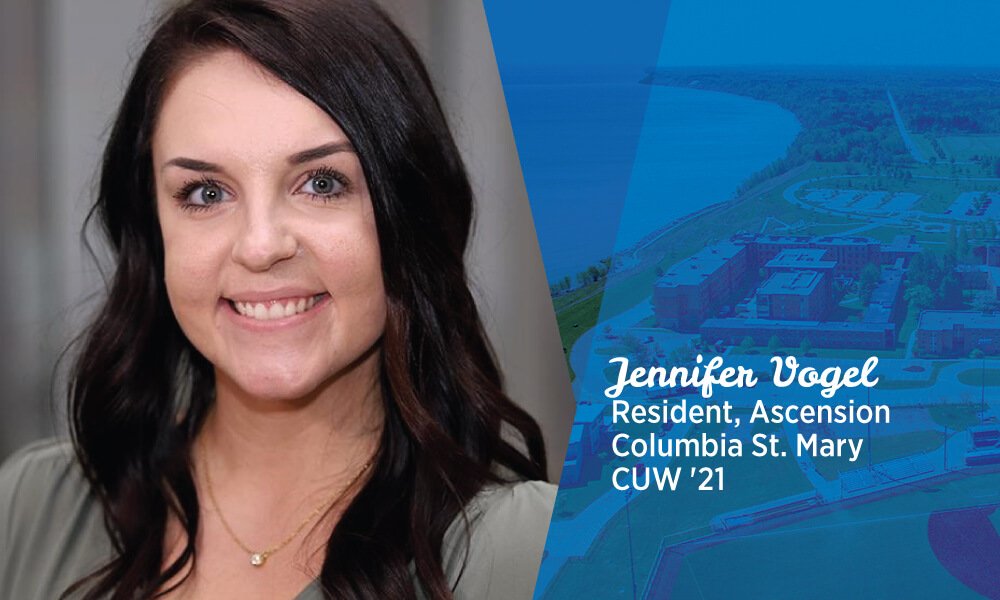
Are you wondering what the pharmacy residency is like? Check out Jennifer's story below.
Choosing to complete a post-graduate pharmacy residency
After graduating from pharmacy school, you can pursue more clinical education or research. If you choose the research path, that’s called a fellowship. (Read all about Austin’s fellowship experience here.) But, if you choose to pursue clinical education, that’s called a residency.
What is a residency?
A pharmacy residency is an organized, directed, postgraduate training program in a defined area of pharmacy practice. It provides the knowledge and experience to further training with a clinical focus. During residency, a resident performs as a licensed practitioner but trains under the supervision of an experienced preceptor. As many as 42% of Concordia University Wisconsin’s School of Pharmacy graduates pursue either a residency or a fellowship.
Learn about Jennifer Vogel’s experience in her residency at Ascension Columbia St. Mary’s in Milwaukee, WI.
What is your current role?
I am currently a PGY-1 Resident at Ascension Columbia St. Mary’s in Milwaukee, WI.
Why did you decide to become a pharmacist?
I was originally an accounting major who was working at CVS Pharmacy as a pharmacy technician to help pay for tuition. I realized I loved helping patients with their medications, and I wanted to learn as much as I could about medicines and disease state management.
What made you want to pursue a pharmacy residency after graduation?
First of all, I had heard that the first year out of pharmacy school is a huge transition. I knew my interests may change as I went from student to licensed pharmacist. I wanted to receive more training and guidance about practicing in different areas of hospital and ambulatory care pharmacy. Also, I wasn’t sure if I was leaning more toward ambulatory care or inpatient care. My residency has rotations in both of these practices and additional specialty rotations, so I’ve been able to see what I like and don’t like.
How did CUW help prepare you for a pharmacy residency?
CUW School of Pharmacy set me up for success as a pharmacy resident in several ways. First, the smaller class sizes allowed me to have better communication with my professors and made me feel comfortable enough to reach out when I was having a tough time understanding concepts.
Getting to know my professors led me to keeping in contact with several even after graduating so we can discuss shared interests such as the opioid epidemic. Additionally, all of the CUW pharmacy professors created learning experiences that required me to understand where to find and how to navigate disease state guidelines and medical research. This has helped me build strong recommendations as a resident since I can find various resources to build my rationale.
The learning environment was professional, but fun. Lessons were strategically built off of knowledge I had already learned in other classes or semesters so that it wouldn’t be easily forgotten. Also, we were able to go on our experiential rotations at sites where professors practiced. This allowed me to see professors model interprofessional communication and great patient care.
Lastly, CUW is huge on community outreach and student organization participation. Working with Student National Pharmaceutical Association (SNPhA) and volunteering at City on a Hill with Dr. Lokken has been very rewarding and has inspired me to continue volunteering during my busy PGY-1 year.
How do you think your residency is preparing you for a successful career in pharmacy?
I believe my residency is providing me the foundational experience I need to practice as a clinical pharmacist. Additionally, I have found new interests in the specialties of informatics and oncology during the first few rotations of my PGY-1. The most important lesson I’ve learned is to never be afraid to ask for clarification from a colleague or from someone in a different department. Coming out of pharmacy school, I was nervous I would be judged for not knowing every little detail about disease state management when prompted with questions by nurses and practitioners. In reality, they are super understanding and realistic if you need to look up an answer. Also, setting expectations makes communication much easier, and helps maintain great patient care.
What has been the most memorable moment of your residency?
My most memorable moment of residency thus far has been observing a bedside paracentesis in the emergency room when I was staffing!
What advice do you have for future pharmacists?
Try to take in as much as you can as a student or resident even if the presented opportunity does not align with your current interests. You will remember disease state management better if you have a memory to connect the disease state or pharmacotherapy with. Also, new experiences may spark an interest you wouldn’t expect!
—
If this story has inspired you, why not explore how you can help further Concordia's mission through giving.